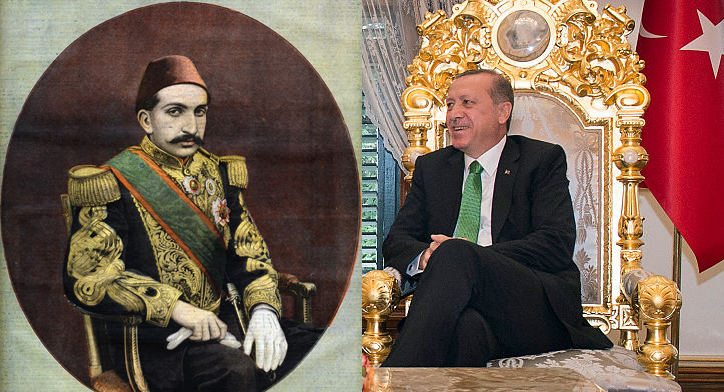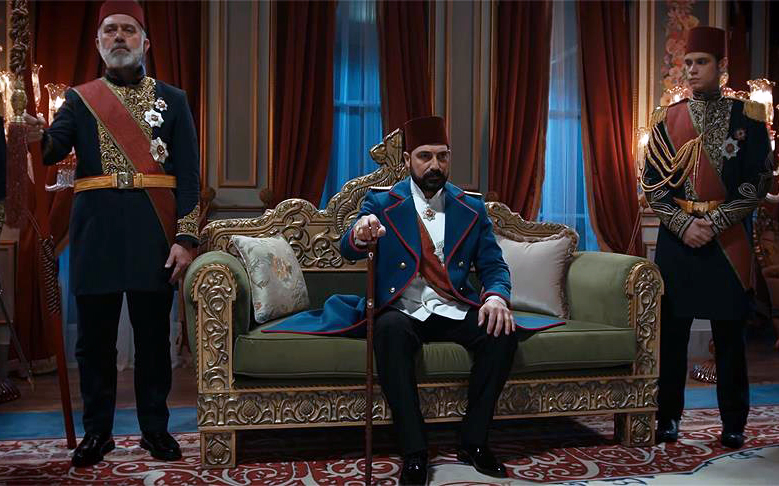On April 16, Turks will vote in a national referendum that will, if successful, give President Recep Tayyip Erdoğan increased powers over parliament, the judiciary, and other parts of the civil bureaucracy. The offices of head of government and head of state will be unified in the person of Erdoğan, and the clock will also restart on his presidential tenure; he could stay in power until 2029. To many Western observers, this will be but the latest step in a return to the kind of authoritarianism that is common to many countries of the Middle East. It also seems to accord with the increasing turn away from democratic practices in many parts of the world, from Putin’s Russia to Trump’s America.
On closer inspection, however, what is happening in Turkey shows distinct traces of an earlier phase of Islamic-minded autocracy in the country’s history. Coming after an era of pro-Western democratization early in Erdoğan’s tenure, the recent shift toward Islamist rule under an unassailable ruler is a reaction to the Turkish Republic’s secular, rationalist twentieth-century founder, Mustafa Kemal Atatürk, as well as to the pluralist strain of modernization that more liberal Turks have advocated. Furthermore, it derives much inspiration from the late Ottoman Empire under Abdülhamid II, who ruled for more than thirty years in the late nineteenth and early twentieth centuries.
A reviled figure, synonymous with despotism and failure in the face of the uxorious powers—this is how Abdülhamid was depicted by the regime of Atatürk, who set up a new republic from the empire’s ruins following its defeat on the battlefield, and who brusquely rejected the old Islamic, imperial heritage. The “red sultan” continued to be vilified well into this century. But Erdoğan’s Islamist movement has steadily undermined the Kemalist legacy since it came to power in 2002—in part by restoring pride in the empire that preceded the republic.
In recent years, Abdülhamid has been the prime beneficiary of this revisionist current. He is spoken of with admiration by government ministers, who refer to him as the “Great Emperor” and—again in reaction to Atatürk, whose campaign of language reform removed many Arabic words from the Turkish lexicon—couch his name with reverential, Arabic adjectives. In stark contrast to the generally hostile silence surrounding the Ottoman ruler as recently as fifteen years ago, he is now remembered in events such as concerts and exhibitions, and an Istanbul hospital was recently renamed after him. On February 24, the state broadcaster aired the first episode of a major new series recounting the last thirteen years of the sultan’s reign, which shows him to be a steadfast, honorable, and pious ruler beset by scurrilous courtiers, iniquitous foreign powers, and a youthful Theodor Herzl scheming for the establishment of a Jewish homeland in Ottoman Palestine. The descendants of the Ottoman royal family, who were exiled from Turkey when Atatürk abolished the dynasty in 1923, have been welcomed back onto ancestral soil. One of these ex-royals, Nilhan Osmanoğlu, recently articulated the nostalgia felt by many Turks when she said, “When we look at the confusion in the Middle East…we see how well the Ottomans administered this part of the world.”
The new political chapter that Turkey may be on the verge of opening comes at the end of an era when the country’s internal affairs had an international dimension. This was because Turkey was locked into a wider political order, first as an empire with European holdings, then an ally of the West in the cold war, and latterly a contender for EU membership. But with the effective shelving of Turkey’s bid for membership of the European Union—Turkey remains a candidate country, but with no realistic chance of joining—the West has lost much of its leverage over the country, and Erdoğan has made clear his preference for conducting relations with leaders who keep their noses out of Turkish affairs. Turkey remains a NATO member but its currently warm relations with Russia give the impression of a country at odds with the West. Last year’s coup attempt by the followers of an exiled Turkish preacher, Fethullah Gülen, and its suppression by pro-government forces, left the West scrambling for a response. Instead it was Vladimir Putin, by offering Erdoğan his immediate and unequivocal support, who came out of the crisis with his standing enhanced among the Turks.
The historic entangling of internal politics and foreign affairs was certainly in evidence back in December 1876, when Abdülhamid promulgated its first constitution, or “basic law.” (The first Ottoman parliament convened the following spring.) The empire had its first experience of constitutional democracy just as its very existence was threatened by the European powers nibbling at the empire’s edges, and its internal serenity by frock-coated liberals, turbaned reactionaries, and minorities like the Greeks and Armenians who militated for rights and autonomy (with European support).
The man who showed himself to be master of this combustible combination was none other than the sultan himself. Abdülhamid had been unexpectedly elevated to the throne a few months earlier, following the quick-fire deposition of not one but two sultans (the spendthrift Abdülaziz and the unhinged Murad V), and he assured liberal politicians that he would intervene politically only on their advice. But the sultan had obstructed efforts by these liberals to give the basic law a more democratic character. He was convinced of his God-given right to rule, and the document he signed, while professing respect for human rights, an independent judiciary, and decentralization, also upheld the infallibility of the sovereign; no bill could become law without his ratification and no law could originate but in the government—which he appointed. In the event, when parliament soon deviated from his wishes, by summoning ministers, the sultan had it dissolved and for the next three decades the empire was synonymous with its pious, paranoid, absolutist ruler.
Even under the new constitution that is the subject of the April referendum, Erdoğan will not be able to shut down democracy as the emperor did. Nor will he need to; as the unquestioned leader of the ruling Justice and Development Party, he will enjoy more influence over parliament than the sultan did over its much more diverse Ottoman predecessor. The country’s liberal, Kurdish, and Alevi minorities are all suffering under the hardening regime.
For all the president’s admiration for the sultan, Abdülhamid’s suspension of the Ottoman parliament did not yield the long-term results he might have wished for. Mistrustful of the Western powers, severe toward their proxies (it was he who launched the first major pogroms against the Armenians, in the mid-1890s), Abdülhamid was nonetheless unable to prevent the loss of much territory to European-sponsored independence movements in the Balkans, while opponents of his police state were summarily banished or, as in the case of the leading constitutional politician, murdered. Not until 1908 did popular pressure oblige Abdülhamid to recall parliament, but even then his supporters plotted against it, until finally, in April 1909, he was overthrown by the secular forces that took Turkey into World War I.
Constitutions are the mirrors of values, and the revisions to Turkey’s basic law that will be voted on in April show a faith in strong men and a yearning for simple truths. Bruised by their languishing and bad-tempered courtship of the EU, and painfully aware that the question of minority rights was exploited to break up the Ottoman Empire, a large number of Turks—a narrow majority, to judge by one recent opinion poll—seem ready to entrust their fate once again to a pious, paranoid, and increasingly absolutist leader. The Turkey of Albdülhamid is in the ascendant, but the modern president whose detractors have bitterly dubbed “Sultan” should take heed: the democrats and minorities did for his predecessor in the end.




